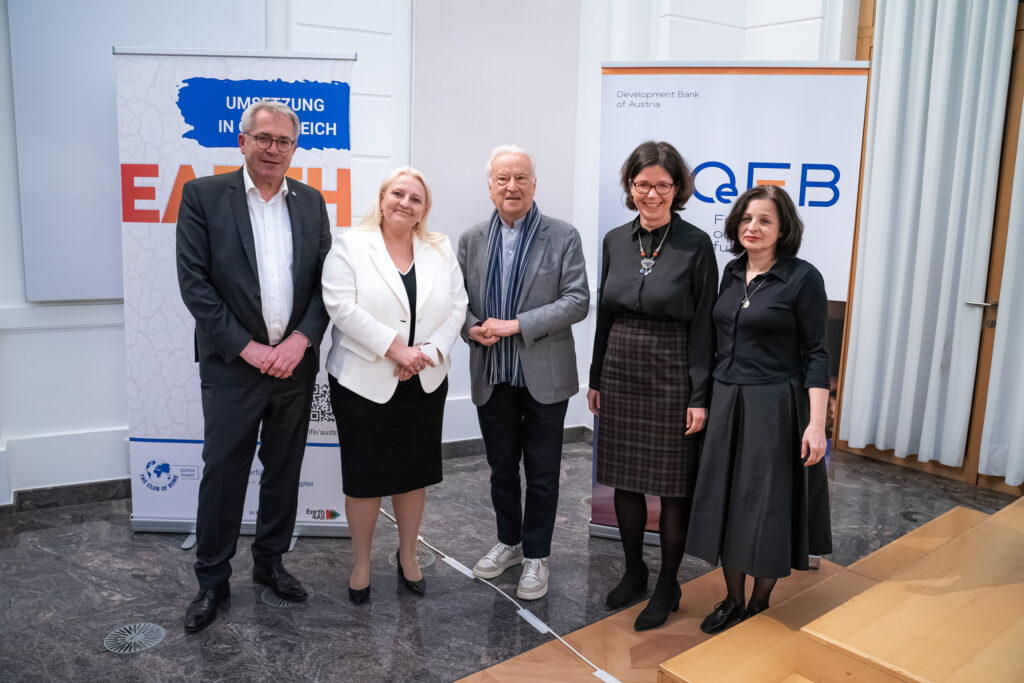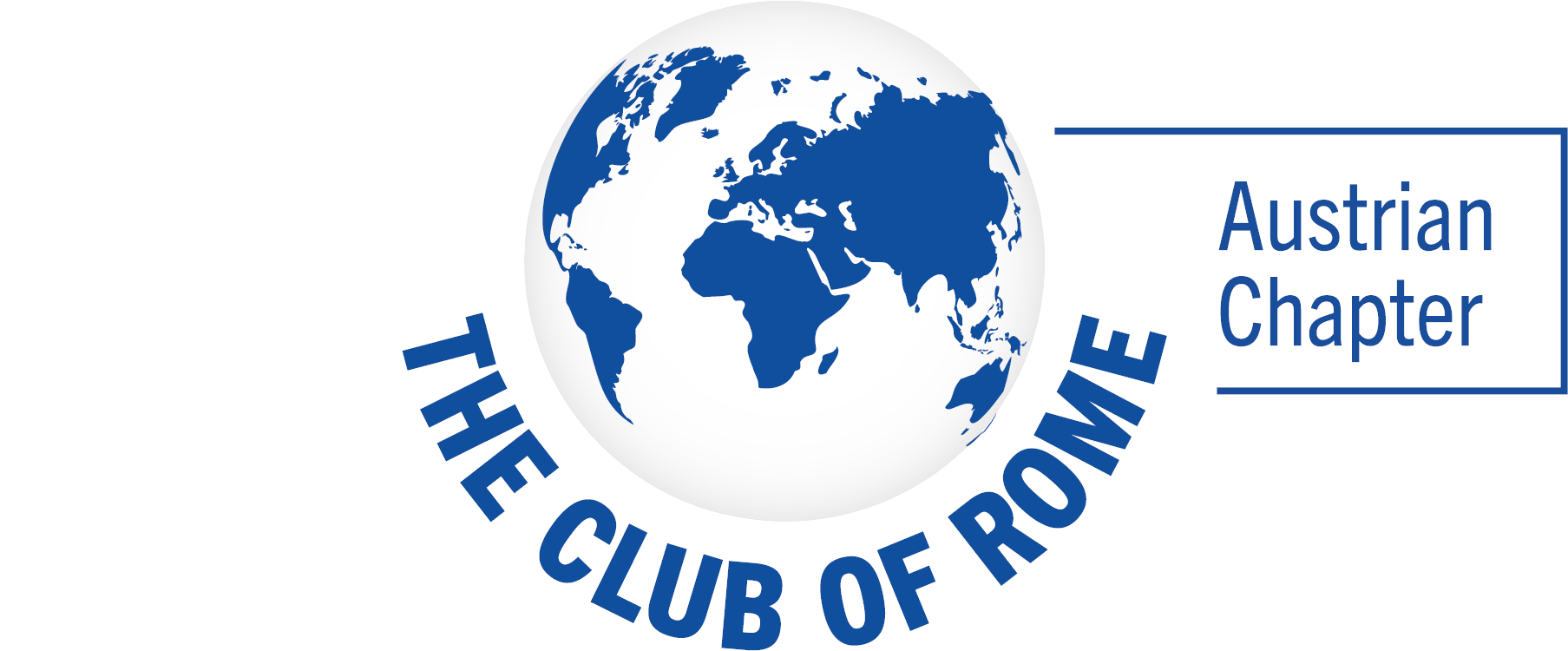In order to lift billions of people in countries of the Global South out of poverty, a transformation of the international financial architecture and global trade agreements is needed. If Austria is to position itself in this regard, it will have to work on systemic solutions. The causes of debt in low-income countries are very different, and the solutions proposed by experts are all the more diverse. A high-ranking panel of experts discussed this topic on April 2 in the Reitersaal of Oesterreichische Kontrollbank AG (OeKB) in Vienna.

WELCOME SPEECH BY PRESIDENT HANNES SWOBODA
Hannes Swoboda, President of the Club of Rome – Austrian Chapter, welcomed the participants on site in Vienna and at home in front of the screens. The issue of poverty must be tackled globally with the right measures: And for this to happen, the economy of the poorest must grow. However, this requires the right, climate-friendly and socially acceptable levers. One of these is energy: 60% of the world’s solar energy capacity is located on the African continent. However, only one percent of this potential is actually being used. Only through cooperation between countries of the global North and South could renewable energy be expanded and poverty combated. In order to help the poorest nations, Swoboda advocates debt relief, but also points to the national political problems in many countries of the global South.
KEYNOTE SPEECH BY VICE PRESIDENT SABINE GABER
In her keynote speech, Sabine Gaber, Vice President of the Club of Rome – Austrian Chapter and member of the Executive Board of Oesterreichische Entwicklungsbank AG (OeEB), referred to the first report of the Club of Rome “The Limits to Growth” from 1972, in which the critical issues of our time were predicted on the basis of computer-simulated scenarios, “which have occurred exactly as they are today”, according to Gaber, and which urgently need to be solved in the next decade.

Gaber went on to explain that due to the high complexity of the global crises and problems, which are closely interlinked, it is important to solve them in a structured and comprehensive manner. The Earth4All Report, which was recently submitted to the Club of Rome, helps in this regard. It uses mathematical, system-dynamic scenarios – such as the “Giant Leap” scenario – to show which specific levers need to be implemented, including in relation to the global poverty turnaround, in order to achieve a comprehensive, rapid and effective change in the current global poverty situation. This is important not only for the affected low-income countries, but for all countries worldwide, given the increasing social tensions, wars, increased natural disasters, growing instability due to inequality and growing emigration.
The 5 turnarounds described in the Earth4All report, are “not a giant leap”, says Gaber, but are realistically achievable, but this requires concrete action at national level and globally.
“Half of the world’s population lives in poverty (less than 5.5 dollars a day)”, while the COVID pandemic, the Russian war of aggression and the geopolitical upheavals have massively changed global trade, resulting in a rise in the cost of living, which has hit poor countries disproportionately hard. These low-income countries, which already have a high debt burden, are further burdened by the global rise in interest rates on debt. At COP28, many countries in the Global South demonstrated that the debt crisis is preventing them from overcoming the dual challenge of climate change and poverty. They have difficulties in obtaining affordable financing for climate-relevant investments, for measures to combat biodiversity loss and for the implementation of environmental and social action plans. The creditworthiness of these countries is already poor from an economic perspective according to international rating agencies. In addition, there is an increased risk of stranded assets due to natural disasters as a result of climate change. “The economic debt crisis in many countries is closely intertwined with the climate crisis and ecological crisis,” Gaber emphasizes. Tackling the global debt crisis is very urgent, a global debt relief system is needed that takes all public and private creditors equally and fairly into account in terms of debt relief, debt restructuring, debt sustainability and it is necessary to link the debt relief system with ecological, social and climate-related transformation processes.
Tax revenues are an important source in this context and tax reforms are indispensable. Among other things, the development of efficient tax administration systems and transparency are of great importance, as Africa currently loses 50 – 80 billion dollars a year through illegal financial flows.
According to World Bank/IMF 2023 estimates, the total expenditure for developing countries to cope with climate change, pandemics and conflicts for the period 2023 – 2030 will be at least around USD 2.4 trillion per year. The development financing system must be reformed in order for these sums to be met. According to Gaber, there is an urgent need for reform of multilateral development banks and international financial institutions, such as the World Bank, to expand the mandate of poverty reduction to include the provision of global public goods, particularly around climate change. However, this urgently requires enormous increases in capital from their shareholders.
Overall, risk access and risk-bearing capacity must be rethought, the IMF’s special drawing rights must be evaluated, the entire financial architecture must be adapted to real ecological, social and economic requirements and not the other way around; a paradigm shift is needed with comprehensive reforms for a harmonized, new global financial architecture that requires a coherent political framework.
Better involvement of the private sector to mobilize private equity to finance the enormous financing gap is of great importance. Public contributions for development and climate financing from donors must also be increased and, as the Earth4All report, like the World Bank, points out, low-income countries should grow. The need for economic growth that boosts the incomes of the poorest could not be greater than it is now, but fair and environmentally friendly growth should be made possible that is not only based on economic values, but also on ecological and social values in equal measure. However, new models are needed in countries where economic growth has already reached maturity.
Global trade agreements must also be restructured, and a transformation must also aim to review CO2 emissions in international trade agreements; CO2 emissions must be accounted for where the products are consumed. Further measures to protect low-income countries must be supported, in particular the promotion of green technology exchange, including by waiving intellectual property rights for patented technologies, Gaber said.
🔗Here is the link to part 2 of the follow-up report on the 2 panel discussions.
Here you will find more related to the Poverty Turnaround:
https://www.clubofrome.at/en/earth4all-austria/turnaround-poverty/
